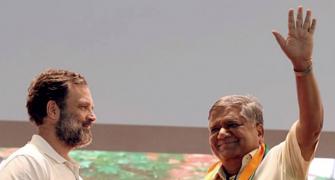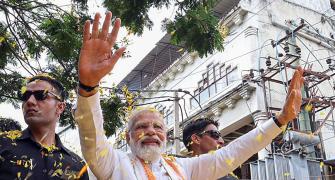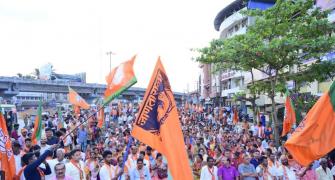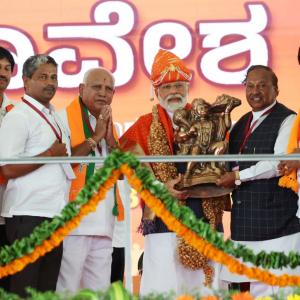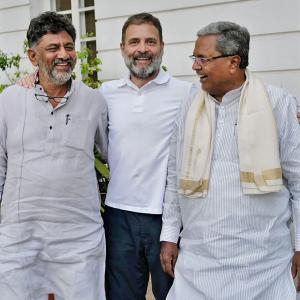'If they harp on it again, they will begin to lose votes.'
'They have not lost this time, but they will lose next time.'
'Your committed votes will never be enough to guarantee victory for you.'

What lessons can be learnt from the Karnataka state elections in which the Congress scored a very decisive victory?
This is also the election where the losing party, the Bharatiya Janata Party, had exactly the same vote share as in the 2018 election where they had won 104 seats.
So, what made the difference this time? How did the Congress vote share increase this time?
Analysing the Karnataka state election results is Prakash Belawadi, the well-known activist and media personality from Karnataka.
"If you feed a hen a lot of food with nutrition, you get better and better eggs, but there is an optimum. If you give more than that, their eggs will become sickly. After a point, return on investment will diminish. That point has long been breached by the BJP," Belwadi tells Rediff.com's Shobha Warrier.
What came to your mind when the results of the Karnataka state assembly elections were out?
Everybody seems to be attributing the BJP's loss to these key reasons, broadly:
First, that Yediyurappa is not there, and so the BJP lost a lot of Lingayat votes.
Second, the places where Rahul Gandhi walked his Bharat Jodo Yatra, especially in the Dalit and tribal seats, many of the ST communities' votes went from the BJP to the Congress.
Third, that the Hindutva issues did not work well with the people, and so many non-Lingayat Hindus too voted against the BJP.
Four, that there were big charges of corruption against the Bommai government, and so the BJP lost a lot of support all across.
Finally, the freebies offered by the Congress won over women voters. So, the BJP lost a lot of women votes as well.
Yes, the BJP lost seats, but the vote share remained the same...
That's exactly what I am coming to. What does it mean?
Let us say, the BJP lost 8% of the vote share overall, including the assumed lost votes of Lingayats, women, tribal belts and even non-Lingayat Hindus.
If so, where did the party get new votes to make up enough to get the vote share as the previous election? That is the question.
Basically, I would say then that those who voted for the BJP last time, voted for them again, give or take one or two percent.
It means anti-incumbency and corruption did not matter to the committed BJP voters.
I don't think any voter in Karnataka thinks corruption will go away when the Congress comes to rule the state.
Though corruption is a major issue here, people do not blame any single party for it.
So, if the vote share remained the same, this was largely an issue-less election.

Then, what about the Muslim population? There were many issues that bothered them to consolidate their votes behind the Congress....
Let me put it this way. It was an issue-less election, except for the Muslims and Vokkaligas.
Halal, hijab etc were major issues for the Muslims. Then, taking away the Muslim quota just before the elections was like adding insult to the injury.
The result, 9 out of 10 Muslims voted for the Congress. In the earlier elections, their strategy was to support the candidate who could defeat the BJP.
But this time, they voted for the Congress, en masse.
If Muslims are 14% of the voters, nearly all of them voted for the Congress and, unlike the Hindus, almost all the Muslims voted.
I want to arrive at this logically. If only 72 cast their votes out of 100, this is what happens.
100 voters comprising of Hindus (all castes) -- 84; Muslims -- 14 and Others -- 2.
If 90% of the Muslims voted, then the Hindus + Others are 72 - 13, that is 59.
If the BJP got 36% of 72 votes, then: (36x72/100) is just 25.92 votes or 26. It means, 26 of 57 Hindu votes went to the BJP which is less than 50%. It also means 27 Hindus didn't even vote.
Among the remaining 31 Hindu votes, JD-S with 13.5% share would get 13.5 x 72/100, which is 9.72 votes or 10 votes.
So, the Congress got the remaining 20 Hindu votes + others + all Muslim votes which adds up to 20+2+13 = 35 votes
So, my conclusion is, only 26 people voted for the BJP out of 100 voters, which is one in four.
The 35 votes for Congress means a little more than 1 in 3.
And the 10 votes for the JD-S out of 100, means 1 in 10.
You should also remember that the bulk of 28 out of 100 that didn't vote, almost all of them were Hindus, who didn't care so much for either the Congress or the BJP.

The BJP talks about 80-20 and say, they only need 80. But when the consolidation of Muslim votes happens, this is the result....
This has been happening ever since India got Independence. If you get above 35% of the votes, you can make the government.
No party in a national government has ever got 50% of the votes.
From Nehru's time, what the Congress has relied on was all of the Muslim votes. Always.
Historically, the Congress used to get all of the Muslim votes, and all of the Dalit votes.
It changed after 1979 when regional parties, like the SP and BSP, grabbed shares of the Muslim votes.
Generally, in an election, only 60%-65% voted, and of which 14% population of Muslims and 20%-25% population of Dalits voted for the Congress, and thus they crossed the 40% mark.
In the case of Karnataka's regional party, the JD-S lost 5% out of last year's 18% vote share. All to the Congress.
In the coming Lok Sabha elections, it will go down below 8% or 7% and they will dwindle further from there on.
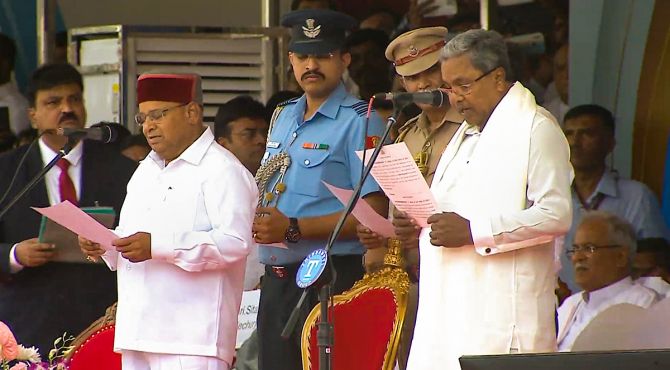
Can we look at the Karnataka elections as the beginning of a new chapter in Indian politics where we will see consolidation of Muslim and Dalit votes once again?
Yes, the Muslims will come back to the Congress. They will not squander their votes with regional parties. This will happen all across India in the coming elections because of the Karnataka results.
Anyway, the BJP would never have got the Muslim votes. So, it is the regional parties that will suffer the most.
If they have any sense, the BJP should realise that consolidating their votes based on Hindutva will work only up to a point.
For example, in Karnataka, it worked up to this 36% vote share. Remember, they get this 36% from 72 and not 100.
They got only 25 votes out of 100 for Hindutva, and something else too.
If you are prejudiced, you can call every BJP voter communal, but I don't think every BJP voter is communal.

What are the lessons to be learnt for the BJP and the Congress from the Karnataka election results?
The lesson for the Congress is that if they get all the Muslim votes, they are back in business.
But they have to understand that just Muslim votes too are not enough.
They have to do more. By doing more, I mean, they have to do real work, governance. This applies to both the parties.
Voters are not voting like before.
In India, all the parties have had committed votes. But this is changing.
The major disruption that happened in Karnataka was that Vokkaligas are breaking up between the Congress and JD-S.
When the JD-S vanishes, Vokkaligas have to break up between the BJP and the Congress. All the Vokkaligas will never vote for the Congress.
So, the BJP will have to cultivate a much larger base of communities to support the party.
In this, their worst election, they have 36% vote share and if they work more, they are back in business.
But in a bipolar election, you need more than 40% vote share.
Development can get you that 5% swing vote when there is an uncommitted vote of 10-12%, which could go any which way.
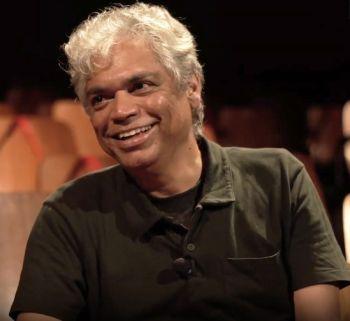 IMAGE: Prakash Belawadi
IMAGE: Prakash BelawadiYou mean, Jai Bajrang Bali slogans alone will not work?
It is like the law of diminishing marginal utility. If you feed a hen a lot of food with nutrition, you get better and better eggs, but there is an optimum.
If you give more than that, their eggs will become sickly.
After a point, return on investment will diminish. That point has long been breached by the BJP.
They have reached a stage where Hindutva will not give them a single additional vote.
The BJP's committed 36% has kept their commitment again this time.
But remember what is happening to parties like the BSP, JD-S, etc... You can't just rely on one community forever.
When they get irritated, the votes will get split. That's the lesson the BJP should learn.
And the truth for the Congress is, they didn't get a positive vote in this election. The Muslim votes they got is not pro-Congress but anti-BJP.
Feature Presentation: Aslam Hunani/Rediff.com

